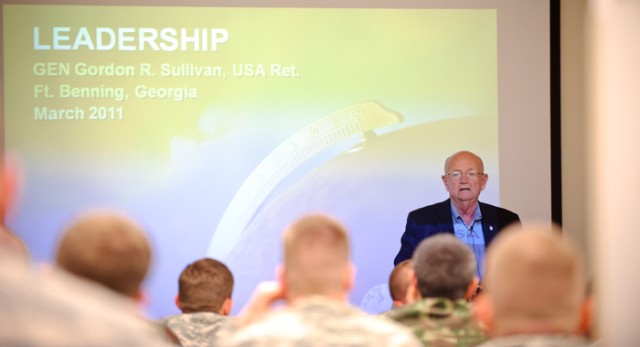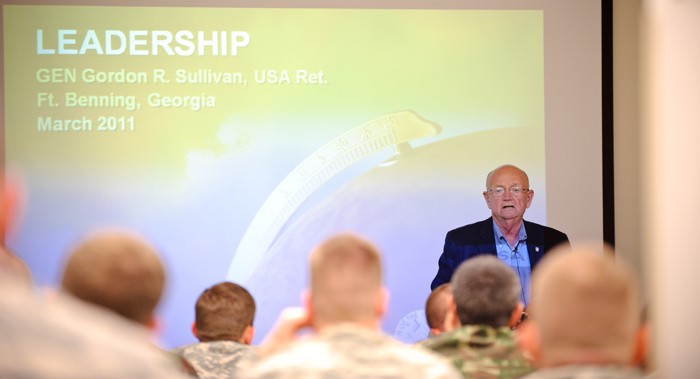FORT BENNING, Ga. - The retired general who served as the nation's 32nd Army chief of staff added his endorsement to the Armor-Infantry consolidation taking place here and praised the "breathtaking" facilities built at Harmony Church to accommodate troops moving in from Fort Knox, Ky.
Gordon R. Sullivan was given a progress report on Maneuver Center of Excellence transformation, toured new buildings and discussed leadership attributes with Soldiers in the Advanced Leaders Course at the Henry Caro Noncommissioned Officer Academy. It was part of a three-day Fort Benning visit that ended Wednesday.
"It's a long time coming that the Armor branch and Infantry branch would combine," he said. "The Cavalry has always fought alongside the Infantry. It was just inevitable it would happen."
Sullivan was Army chief of staff from 1991 until his retirement four years later. He entered the service as an Armor officer in 1959.
Bringing the Infantry and Armor together at one location was proposed in the 1980s and briefly talked about again the following decade, he said.
"It's very impressive what's going on physically, but what's more impressive to me is the way in which the leadership has embraced the concept - from the noncommissioned officers to the officers in both branches," he said. "That's really the important part of what's going on here. What we have now is a very cohesive force."
The Infantry and Armor schools maintain their historical identities under the MCoE umbrella, but the merger will yield long-term benefits for Army operations and training, Sullivan said.
"First of all, it costs less money because you can optimize the manpower you have in the schoolhouse (and) we have a lot of land here," he said. "When you combine everything that's going on here ... that saves money and resources. I think it's going to be very positive for the country."
He offered his impressions of the Armor School's new home and said the elements no longer will inhibit training.
"Breathtaking - it's amazing, it's wonderful," he said of the engineering and modernization efforts that went into the facilities. "Frankly, it's hard to believe the capabilities ... with the maintenance bays, the environmentally controlled learning spaces and capability to move heavy armored vehicles into those buildings and work on them in a controlled environment. You're not worried about hail and sleet and snow and cold and rain.
"We'll get them out in the mud when they do their recovery training with the Armor and Cavalry guys, just like we get the Infantrymen in this red clay you have down here, which seems to be ubiquitous along with the kudzu. But that's all a part of being a Soldier, and they learn it here."
As Armor's relocation to Fort Benning shifts into high gear ahead of the MCoE's Sept. 15 deadline for full operating capacity, Sullivan said the parties can ease the transition by reinforcing the legacy established here in the early days of World War II, when the Infantry School co-existed with George Patton and the 2nd Armored Division.
"It worked then and it's working now," he said. "Embrace the traditions of the U.S. Army and you're going to be fine. ... Tradition is important. What you represent and what your histories represent is strength, and you can't have enough."
When in charge, be in charge
Meeting with a group of ALC students from the Henry Caro Noncommissioned Officer Academy in a March 22 session at the National Infantry Museum, Sullivan hammered the importance of leadership in today's fight. With less than 1 percent of the American people even signing up for duty, Army NCOs are the "living embodiment" of U.S. fortitude, he said.
"Noncommissioned officers like you have been a huge part of my life," he said. "Thanks for what you do. Thanks for what you represent. You really are the strength of the Army."
Sullivan said leaders must be motivators and team builders while managing complex processes and creating a future.
"You've got to balance all these out, and it ain't easy," he said. "Leadership is a team sport. It begins with values and vision ... but expect to be surprised. You have to say, 'Here's what we're going to do. But if this happens, here's how I will react.'"
And there's only one kind of discipline, even for an Army that's been at war the past decade, he told the group.
"Don't let anybody sell you the line that says, 'He's a combat Soldier, he can't operate in garrison.' It ain't that simple, guys," the general said. "Good combat Soldiers can operate equally well in both environments, and that's your challenge - to make that happen."
Sullivan, who served one tour in Korea and twice in Vietnam, said he learned there are no universal truths and the world has changed.
But people remain the Army's essence, not materials or equipment, and listening is just as important for a leader as communicating, he said. Grasping the human dimension is critical.
"It's the men and women who have the courage to climb into helicopters and get into trucks each and every day, knowing that when they get out of that sack, they may not get back in it. That's what courage is all about," he said. "It takes courage to do what you do and what your Soldiers do. ... In these wars, everybody is vulnerable. What you teach them will count."
Sullivan stressed what he considers a cardinal rule of leadership: When in charge, be in charge.
"Don't wait for instructions. Don't stand around waiting for someone to show up and tell you what to do," he said. "'Hope' is not a method. ... Make good things happen and stop bad things from happening. It doesn't happen because you 'hope' it."
Sullivan spotlighted a letter written by Gen. William Sherman to Gen. Ulysses S. Grant during the Civil War that reads, "I have always known if I was in trouble and you were still alive, you would come to my assistance."
"Just think about what he said, 'If I'm in trouble, you're going to come and get me or die trying,'" Sullivan said. "That's what motivates people like us. ... You need to put that in the very souls of your troops. They need to know that about you, and you need to know that about them."


Social Sharing